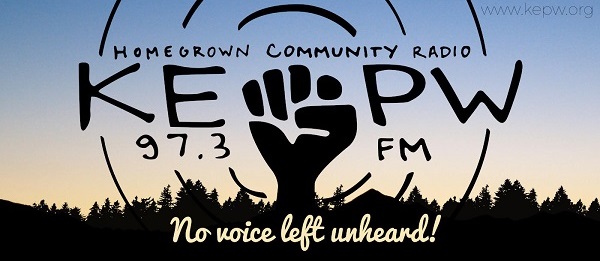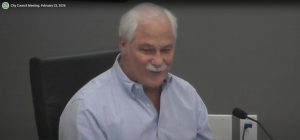Front Rooms closure means community is losing the ‘safety net beneath the safety net’
8 min read
Presenter: The KEPW program Underground Echo talks about White Bird’s Front Rooms shutdown. With a question for Robin, here’s Echo.
[00:00:07] Echo: We’re diving into the heart today of a community issue. We’re discussing this critical topic, the closure of White Bird Clinic’s Front Rooms in Eugene. What would you say to those who may not fully understand the significance of the Front Rooms?
[00:00:20] Robin: Whatever level of, like, peace there is in Eugene, a good chunk of this is from White Bird in general and especially from the Front Rooms Department in specific.
[00:00:28] A lot of the interactions that we have in the Front Rooms department are interactions that do not result in people going to jail, or in potentially something really destructive happening on the streets and in the neighborhoods.
[00:00:42] Presenter: From the White Bird Front Rooms program, Krista.
[00:00:45] Krista: Front Room has always been considered kind of a gateway to the other programs at the clinic. A lot of people who I speak to in my role at Front Rooms, or when I’ve done case management with NEST (Navigation Empowerment Services Team), that’s the other department that’s unionized with Front Rooms, people will say, ‘I went to another agency and they told me go to White Bird.’ Like, all of the time.
[00:01:02] So, Front Rooms workers don’t really know what to expect when people walk through the door. It could be literally anything. They’re the first faces that new clients see, so they do overdose reversal. They act as crisis counselors. They de-escalate people if they’re upset or if there are fights. They act as advocates.
[00:01:30] I’ve actually answered the phone on shift doing reception for Front Rooms, and I had to engage in crisis counseling with someone who is suicidal because they did not want me to transfer them to the crisis line. So, you know, you have to be there and be ready for anything.
At one time, I think Front Rooms staff were potentially reversing multiple overdoses a week.
[00:01:48] Clients know that they’re really like safe with them to, like, run and say, ‘Hey, like we need your help.’
[00:01:54] Presenter: Speaking on KEPW’s Underground Echo, from the White Bird Front Rooms program, Robin:
[00:02:00] Robin: It’s extremely intense working conditions. The working conditions in the Front Rooms department are always pretty intense. As conditions continue to worsen on the streets and other facilities like the PeaceHealth University District Hospital and Hourglass Crisis Center have been closing, our jobs have really only become more intense over the past couple years while the need has grown a lot greater.
[00:02:21] There’s another, you know, compounding factor that it’s turning into winter right now. The days are getting shorter and the nights are getting a lot longer.
[00:02:28] And it’s also been intense on an emotional level. For people who work at White Bird, this job is really like your whole life. We’re not here to make a lot of money or anything like that. We’re here for the work itself, to help people, to be a part of it all.
[00:02:44] And on another level, it’s been intense because we need to finish our contract, and after the Front Rooms Department is closed, there will be one person on the bargaining committee, completing the contract for NEST.
[00:02:55] Presenter: The crisis at White Bird will be felt throughout the city. Host of Underground Echo, Wednesdays at 6 on KEPW, here’s Echo.
[00:03:03] Echo: We’re focusing on the closure of White Bird Clinic’s Front Rooms and its impact on our community. And we’re joined by front room employees, who are facing job loss due to this closure. Krista:
[00:03:14] Krista: Management says that services are going to continue, but they’re going to shift dramatically. We’ve been told that the hours for mail pickup, where people can currently come by seven hours a day, seven days a week, are going to narrow down to three hours a day, five days a week, and that’s such a tight window for folks to be able to make it.
[00:03:35] You know, people receive important documents. You get housing notification letters that you have to respond to in two or three days. You get your paychecks and that could be the difference of somebody staying out on the street for one more day or like missing their rent payment or something and getting kicked out.
[00:03:52] So, yeah, some of this stuff’s going to remain, but it’s going to be so much harder on folks. I think that a lot of us who have worked at Front Rooms and have done case management and things like that, we’ve seen people come to White Bird who are very first, like, it’s their first night entering homelessness.
[00:04:11] With rents increasing, the eviction moratoriums being lifted from the pandemic, things keep getting harder and harder and creating more barriers to accessing services.
[00:04:23] I don’t want to be dramatic, but it could just be like that one day that’s going to make or break somebody’s position, you know?
[00:04:30] Robin: You know the building at White Bird—the 341 East 12th building—is painted like a lighthouse. People know to go there when they don’t have anywhere else to go. Whether it’s like a bomb cyclone weather event that’s happening, or getting out of some kind of dangerous situation in your life.
[00:04:45] Or you’ve been homeless 20 years ago and you’ve just become unhoused again. That consistency, knowing you can go there, it’s been told to me that it means a lot to people.
[00:04:56] Echo: It does. And I can tell you that trafficking survivors rely very heavily on your services, too.
[00:05:04] Presenter: Nikolai asked Krista about the shutdown in the context of unionization at White Bird.
[00:05:09] Nikolai: Do you guys believe that this is union-busting here? Is that the main driving force behind them, or are they being genuine with, ‘We don’t have the money for it’?
[00:05:17] Krista: Yeah, so I mean, I can’t really say that it’s union-busting, but management has said that they’re going to continue services, right? So they did recently hire for both a receptionist and a new position called a safety monitor, pretty much word for word, if you read the job description, are the jobs of current Front Rooms employees who are unionized.
[00:05:40] And those jobs were also not offered to anybody in Front Rooms. We could apply. We could definitely apply, and they would give preferential treatment in terms of at least interviewing, but yeah, I don’t know that anybody really knew that the job postings went up. They weren’t told specifically that the job postings went up, and they got, yeah, snapped up like that, so.
[00:06:03] Nikolai: So to be clear, just to make sure I’m not getting confused: You, the unionized staff are being removed, and the new positions will be non-union ones, is that right?
[00:06:12] Krista: That’s my understanding.
[00:06:14] Presenter: Other White Bird staff reminded us that though the Front Rooms program is closing, the needs will remain. During an interview for KEPW News, Georgia Quinn.
[00:06:24] Georgia Quinn (White Bird volunteer coordinator): Taking away Front Rooms is not going to stop or slow down the amount of incidents in that area. There will just be less people to respond to them because currently it has solely been Front Rooms.
[00:06:36] Presenter: In an interview on Underground Echo, Wednesday at 6 on KEPW, Robin:
[00:06:40] Robin: After Dec. 13, I have a difficult time even imagining what the outcomes for clients are. I’d like to emphasize that we provide to the people who so badly need these things, all of these things, consistent expectations and boundaries based on years of rapport, compassion and recognition, crisis intervention from people who intimately know them. This is the framework for people who are having a difficult time getting up on their feet, the framework that actually helps them get up on their feet.
[00:07:06] I don’t know what will happen when this continuity of training and of grounded presence and compassionate care is interrupted, and the rug gets pulled out from underneath folks.
[00:07:15] The Front Rooms department is supposed to be the safety net beneath the safety net. We are there to help people who no one wants to work with. This is at least partially why, as my colleague noted, people will just send you down to White Bird if you try to get services from another agency.
[00:07:31] We serve people who are banned from every social service agency in the entire county. Sometimes we have to work with people slowly over time to get them to a place where they are ready to get services in the first place, and we, the workers of Front Rooms, are the ones who actually facilitate that process.
[00:07:47] We are the support, and without us, I’m really not sure where that support will come from. Moreover, our services are really not duplicated elsewhere. We know that St. Vinnie’s doesn’t have the ability to absorb this massive flow of mail clients, should clients choose not to use the Front Rooms Department for mail anymore.
[00:08:05] We know many other resources are not available to clients just because of the nature of barriers of care. These are things that are already existing, wherever they are at in their healing or their recovery process, any of that, you get care. That’s the point of Front Rooms. Yeah, it’s already kind of like a final option for a lot of people.
[00:08:21] Presenter: Robin said a fund has been established for the nine former White Bird workers.
[00:08:26] Robin: Yeah, I would encourage people who have the means to check out the WBFR NEST Instagram page, which has a link tree on it where you can donate to aid for White Bird Clinic workers facing sudden layoff. Many of us, due to the low wages, have to use different, like, rental assistance programs throughout the county in order just to make ends meet, so losing our jobs this suddenly is pretty bad. Kind of a economic catastrophe for us. And you can also sign a petition to keep Front Rooms open on this link tree as well.
[00:08:58] Just in general, like, where there are direct service workers, people in helping professions who are struggling, who are taking to unionization, wherever there are rallies, go ahead and support them, whatever they’re asking for, try to meet their needs, because these jobs are hard and they’re under attack.
[00:09:13] Echo: I’m your host Echo. Today we stand at a crossroads. This is not just a building. It is a lifeline for over 1,200 houseless individuals who rely on its services. Without this service, many will face increased hardship, and this is life or death.
[00:09:34] I encourage my listeners to demand solutions that provide safety and support for us all. We must build a community together where every individual has access to the help they need.
[00:09:50] Presenter: By shutting its front doors to the most vulnerable, Eugene is losing ‘the safety net beneath the safety net.’ For the latest developments, listen to KEPW, and join Underground Echo Wednesdays at 6, or see the Instagram page for White Bird Front Rooms (WBFR) NEST Union.




